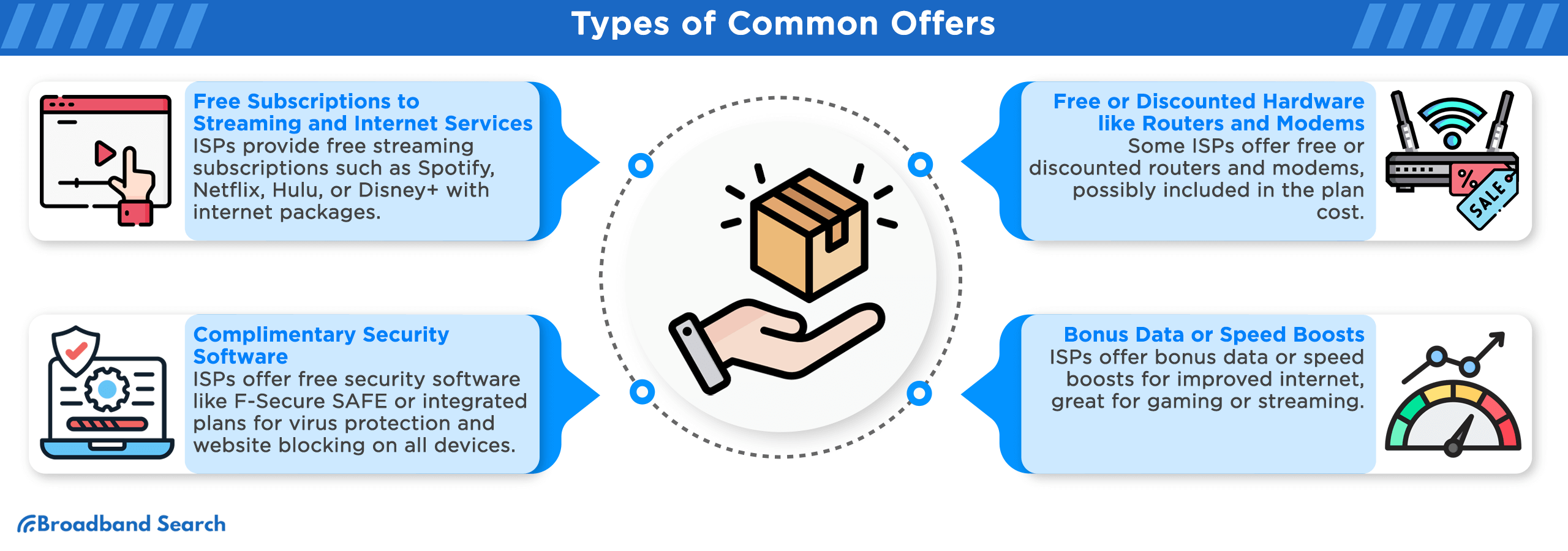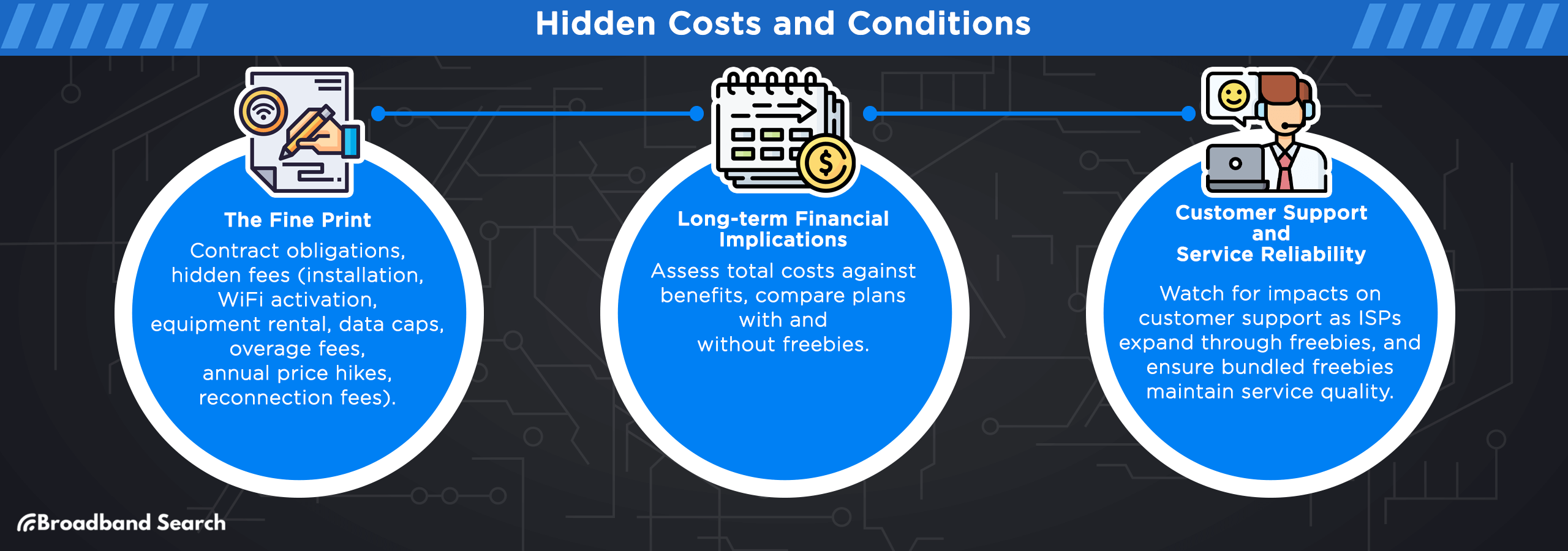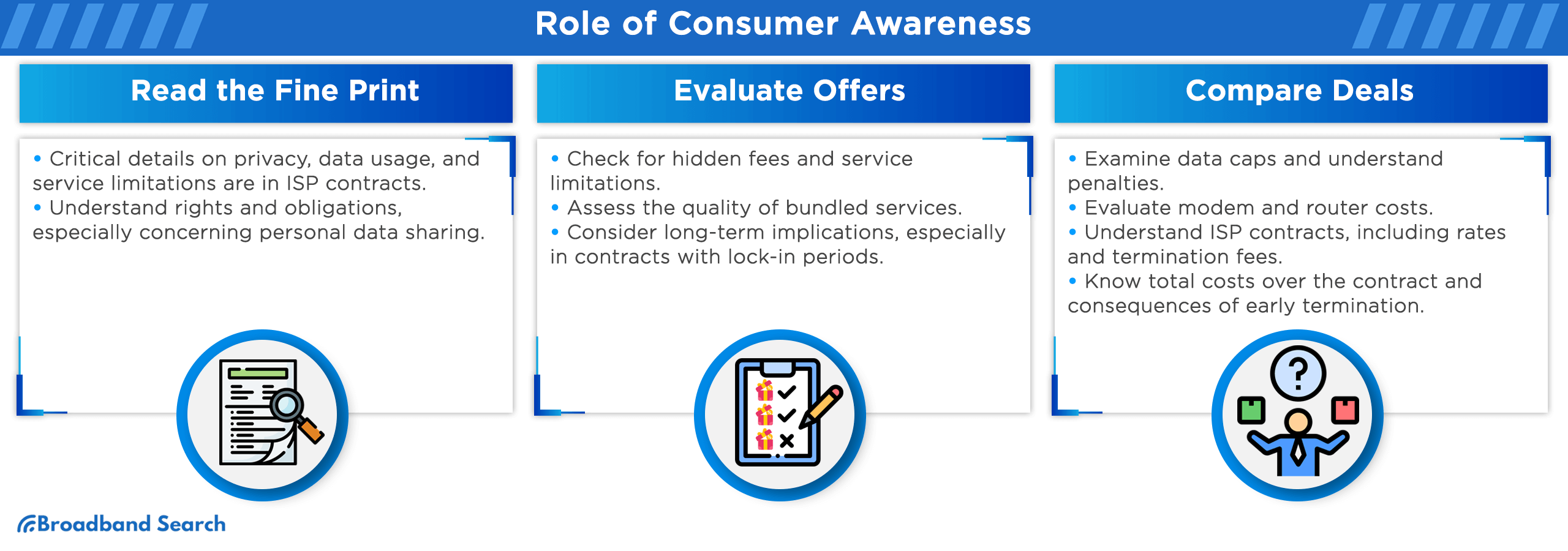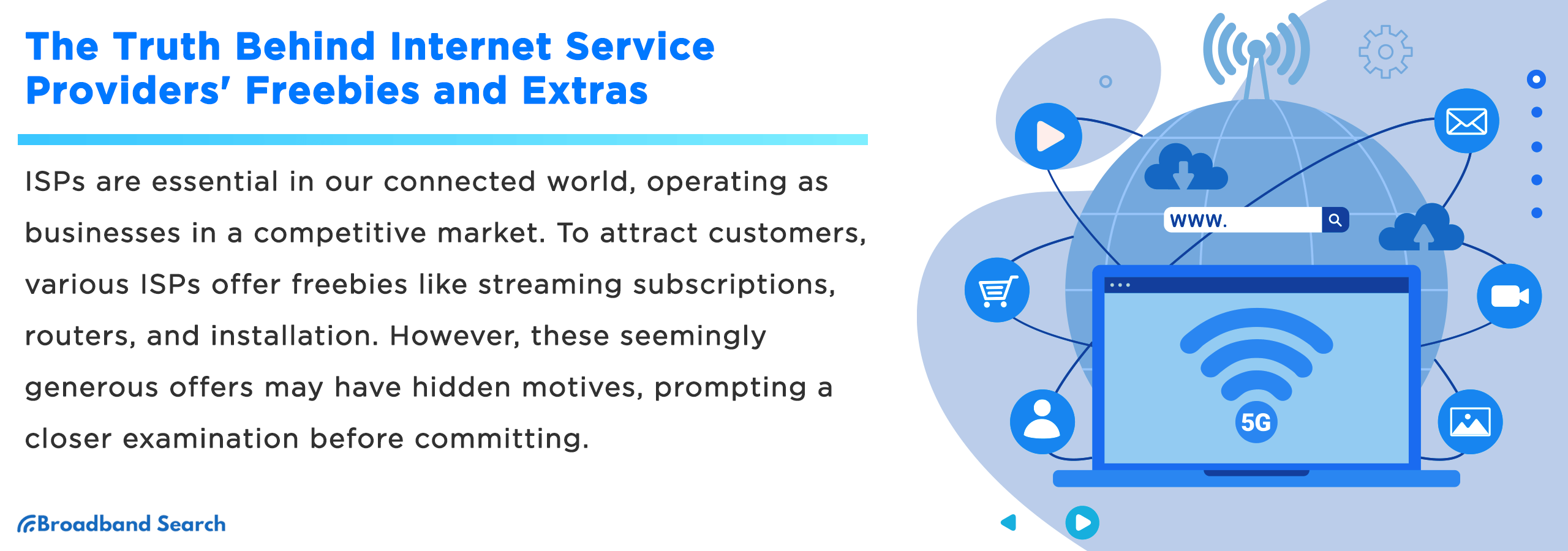Internet Service Providers (ISPs) play a crucial role in our connected world, but they are businesses nonetheless. In today's highly competitive market, where numerous ISPs vie for our attention, customers are often enticed by a wide array of freebies and extras offered alongside their internet plans. From complimentary streaming subscriptions to free routers and installation, these incentives have become increasingly common in the industry to get new customers to sign up.
Yet what are the real motivations behind these tempting offers? Nothing is as “free” as it might seem on the surface. While these freebies may seem like generous gestures, a closer examination reveals a more complex reality, one that you should know before signing the dotted line.
The Fascination Behind Freebies and Extras
As competition in the ISP industry intensifies, these freebies and extras become key differentiators, attracting customers with tailored benefits beyond basic connectivity. To make an informed decision, you should be aware of about the following tactics and motives:
Types of Common Offers

- Free Subscriptions to Streaming and Internet Services: Many ISPs have partnered with streaming platforms to offer free streaming subscriptions as part of their internet packages. What better way to test out your lightning-fast internet than with a Spotify subscription, for instance? You can similarly find plenty of ISPs offering a Netflix, Hulu, or Disney+ subscription as part of their packages.
- Complimentary Security Software: ISPs often include internet security as part of your package. Virgin Media, for instance, offers 12 months of F-Secure SAFE for free. Similarly, Talk Talk’s Home Safe plan is integrated into the network to block viruses and certain websites from all devices on your network.
- Free or Discounted Hardware like Routers and Modems: Some ISPs offer hardware such as routers and modems either for free or at a discounted rate as part of their service packages. This can include high-speed modems or advanced routers necessary for optimizing the internet connection. However, these freebies can just be baked into the plan's cost.
- Bonus Data or Speed Boosts: ISPs sometimes offer bonuses like extra data or temporary speed boosts to enhance your internet experience. These can be especially appealing for users with high data usage or those who need faster internet speeds for activities like gaming or streaming.
Marketing Strategies Behind These Offers
- Attracting New Customers: ISPs employ various marketing tactics to appeal to potential customers. This includes offering attractive bundles, implementing referral programs, and providing freemium services to get people to notice and discuss the service(s).
- Retaining Existing Customers: Customer retention is another critical area of focus. ISPs strive to keep their current customers engaged and satisfied. This can be achieved through loyalty programs, exceptional customer service, and continuous improvement based on customer feedback.
- Differentiation from Competitors: In a highly competitive market, distinguishing themselves from other ISPs is vital for providers. This can be done through unique service bundles or innovative digital services beyond basic internet access. Such differentiation helps ISPs to stand out in the market and attract customers looking for a level of convenience that is not readily available from other providers.
The Hidden Costs and Conditions
When delving into the world of ISP freebies and extras, it's essential to consider the hidden costs and conditions often attached. Enticing offers can sometimes come with less obvious expenses or requirements that may affect their overall value.

The Fine Print
- Contractual Obligations and Lock-in Periods: Many ISPs require customers to commit to a contract for a specified period, typically ranging from one to two years. Canceling the service before the contract expires can result in early termination fees (ETFs). However, some ISPs offer contract-free internet plans that allow you to terminate the service anytime without facing cancellation fees.
- Hidden Fees and Service Charges: ISPs often have a range of fees that can significantly increase the overall cost of the service. These can include:
- Installation Fee: This can range from $35 to $200 and covers the cost of setting up the service at your residence. Some ISPs may waive this fee as part of a promotion.
- WiFi Activation Fee: This is an additional fee for setting up Wi-Fi service in your home, usually between $10 and $15.
- Equipment Rental Fee: Monthly fees for leasing internet equipment like modems and routers can range from $5 to $15.
- Data Caps and Overage Fee: Exceeding your monthly data allowance (if there is one) can lead to overage fees, typically around $10 for every additional 50 GB of data used.
- Annual Price Hike: ISPs may increase their plan prices annually to compensate for inflation and other costs.
- Reconnection or Restoral Fee: If your service is suspended and then reactivated, you may face a reconnection fee ranging from $20 to $50.
- Early Termination Fees: Canceling your service before the end of your contract can lead to ETFs, which can be as high as $400, depending on the provider.
Long-term Financial Implications
- Cost-Benefit Analysis Over the Contract Period: When evaluating ISP contracts, especially those that span several years, it's essential to analyze the total costs against the benefits. This includes considering the monthly service charges, installation fees, equipment rental fees, and any additional charges for services such as unlimited data.
- At the same time, consider the benefits of the freebies received, such as a subscription to a streaming service. However, only count it if you plan on using such a service.
- Comparison with Plans Without Freebies: Contracts without many freebies may initially seem less attractive, but can be more financially beneficial in the long run. These plans are often more straightforward, with fewer hidden costs. It's essential to evaluate whether the freebies offered in other plans genuinely add value or are simply a lure to lock in a longer-term commitment with higher overall costs.
Customer Support and Service Reliability
- Impact on Customer Support Services: As ISPs grow their customer base, often through freebies and special service offers, maintaining high-quality customer support becomes challenging. ISPs must invest in robust support infrastructure and staff training to meet customer expectations in service reliability and transparent pricing. Whether they do so is another matter.
- Reliability of Services Bundled as Freebies: The reliability of free services bundled by ISPs, like streaming or additional data, is crucial. While attractive, these offerings must not compromise overall service quality. ISPs are challenged to manage network loads and ensure these freebies meet customer expectations.
The Role of Consumer Awareness
Consumer awareness emphasizes the need for consumers to be vigilant, questioning, and knowledgeable in their choices. Understanding the nuances of ISP offers is crucial, not just for getting the best deals but also for avoiding unforeseen commitments and expenses.

Understanding Terms and Conditions
- Importance of Reading the Fine Print: The terms and conditions of ISP contracts often contain critical information about privacy, data usage, and service limitations. Read these fully to understand your potential rights and obligations. This is especially important in cases where ISPs might share personal data with third parties.
- Tips for Evaluating Offers Critically: It's essential to look beyond the promotional aspects and understand the underlying terms when evaluating ISP offers. Here are some tips:
- Check for Hidden Fees and Charges: Look for additional costs that might not be immediately apparent in the offer. This includes installation fees, equipment rental charges, and penalties for contract termination.
- Understand Service Limitations: Be aware of any limitations on the service, such as data caps, speed throttling, or restrictions on certain types of internet usage.
- Evaluate the Quality of Bundled Services: If the offer includes freebies like streaming services or security software, assess the quality and reliability of these services. Remember, these freebies are often included as an incentive and may not always meet your expectations.
- Consider Long-Term Implications: Evaluate the offer in terms of long-term value, especially if it involves a contract with a lock-in period. Consider the potential costs and benefits over the entire duration of the contract.
Navigating Promotional Offers
Strategies for Comparing Deals Across Different ISPs
- Examine Data Caps: Understand the data limits on each plan. Some ISPs have "hard" caps with strict penalties for exceeding limits, while others have "soft" caps with overage fees.
- Modem and Router Costs: Consider whether to buy or rent modems and routers. While renting may seem convenient, purchasing your own hardware can be more cost-effective in the long run, unless you frequently move or the rental fee is small.
- Understand ISP Contracts: Pay attention to promotional versus regular rates, contract length, and early termination fees (ETFs). Ensure you know the plan's total costs over the contract duration and the consequences of terminating the contract early.
Regulatory and Ethical Considerations
Among ISPs, regulatory compliance and ethical practices focus on net neutrality, consumer data protection, and fair competition. Transparency in advertising and prioritizing consumer rights are key ethical concerns.
ISP Regulations and Policies
Government and Industry Regulations Impacting Offers
- Federal Regulation: In the United States, ISPs are regulated at the federal and state levels. The Federal Communications Commission (FCC) plays a significant role in this regulation. The FCC's authority stems from the Federal Communications Act of 1934 and the Telecommunications Act of 1996. These acts aim to promote competition and technological innovation in the telecommunications industry.
- Recent Developments: Recently, the FCC introduced new rules requiring ISPs to display essential information more clearly, such as speed, fees, and data included in plans.
Consumer Rights and Protections
- Misleading Offers: Consumers have legal rights concerning misleading offers. The FTC Act of 1914, for instance, regulates deceptive practices and can be used to bring companies to court for violating user privacy or not adhering to their advertised privacy policies.
- Online Privacy Laws: While the U.S. does not have a comprehensive law regulating online privacy, a combination of state and federal laws addresses this issue. The Electronic Communications Privacy Act (ECPA) of 1986 and the Computer Fraud and Abuse Act of 1986 are examples of laws that protect certain communications and prohibit unauthorized access, interception, and disclosure.
- Role of Consumer Protection Agencies: Agencies like the FCC and the Federal Trade Commission (FTC) play significant roles in protecting consumer rights. They ensure that ISPs adhere to regulations and ethical standards. They take action against companies that engage in deceptive or unfair practices.
The Future of ISP Freebies and Extras
Emerging Trends and Predictions
The ISP market in the United States is highly competitive, with many broadband ISPs vying for consumers. The continuous demand for faster and more reliable internet connections is a major driving force, pushing ISPs to adopt new technologies like fiber to the home (FTTH) and mobile internet services.
ISPs are expected to diversify their offerings beyond basic internet access, incorporating services like cloud computing, edge computing, cybersecurity, and wireless internet. Personalization and innovative offers are predicted to be vital strategies for ISPs to distinguish themselves in the market.
Final Thoughts
ISPs consider these freebies and extras a heavy part of their marketing and business in a competitive marketplace. In the future, ISPs will likely offer more diverse and personalized services, leveraging technologies like cloud computing and IoT.
As you navigate these changes, it’s essential to critically evaluate ISP offers, focusing on how they align with your specific needs. Consider the quality, reliability, and privacy aspects of these services. Remember that just because something is free doesn’t mean you might pay for it at some point. Stay informed about trends and options, and make the right decision about your ISP and plan when the time comes.
FAQ
How do bundled offers from ISPs affect my choice of streaming services?
Bundled offers from ISPs can include subscriptions to specific streaming services. These bundles might influence your choice, especially if they offer a preferred streaming service at a discounted rate or as part of the package.
Can I still avail of freebies if I'm an existing customer upgrading my plan?
Many ISPs offer freebies or special deals when existing customers upgrade their plans. It's always advisable to check with your ISP for any current promotions applicable to upgrades.
Are there any educational or student-specific freebies offered by ISPs?
Some ISPs offer special freebies or discounts for students or educational purposes. These can include discounted plans or free access to educational resources.
How often do ISPs change their freebie offerings?
ISPs can change their freebie offerings periodically. The frequency varies by provider and market conditions. It's a good idea to stay updated with your ISP's latest offers.
Can freebies be combined with other promotional discounts?
Often, ISPs allow freebies to be combined with other promotional discounts, but this can vary. You should check the specific terms and conditions of each offer for eligibility.

